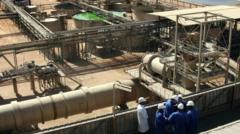As voters weigh their future ties with Denmark, the outcome could significantly impact the Arctic territory's trajectory in the global arena.
**Greenland's Independence Vote: A Pivotal Moment Amidst Trump's Controversial Interest**

**Greenland's Independence Vote: A Pivotal Moment Amidst Trump's Controversial Interest**
In a historic election, Greenlanders head to the polls amid a heightened focus on independence and international interests, particularly from the United States.
Residents of Greenland are set to cast their votes on a crucial independence referendum, with this election drawing unprecedented international attention due to U.S. President Donald Trump's ongoing fascination with acquiring the territory. Historically overlooked, this vote holds the potential to shape Greenland's relationship with Denmark and its political future.
For nearly 300 years, Denmark has governed Greenland from nearly 3,000 kilometers away. While Greenland exercises self-rule in domestic matters, foreign and defense policies remain under Copenhagen's control. As campaigning intensifies, five out of six parties in the election are advocating for independence, differing primarily on how swiftly such a transition should occur.
The climate has shifted dramatically since 2019 when Trump first brought up the idea of purchasing Greenland, raising eyebrows globally. His recent remarks during a Congressional address echoed past aspirations, claiming, "We need Greenland for national security. One way or another we're gonna get it." Greenlandic leaders promptly condemned his comments, with Prime Minister Mute Egede emphasizing the need for respect toward Greenland's sovereignty.
The heightened interest from the U.S. has ignited discussions on whether and when Greenland should pursue independence from Denmark. While such aspirations are not new, the current political landscape has intensified these conversations. Past grievances regarding the treatment of Inuit communities have also fostered a growing discontent towards Danish rule.
Prime Minister Egede's party, Inuit Ataqatigiit (IA), is advocating for a gradual transition toward independence, aiming to ensure stability for citizens during the process. Conversely, the Naleraq party has called for immediate steps towards severing ties with Denmark, seeking closer ties to Washington. With concerns about maintaining economic viability, particularly as the economy is largely supported by Danish subsidies, differing perspectives dominate the political landscape.
Amidst the focus on independence, less attention has been given to pressing issues such as healthcare and social welfare, which has drawn criticism from local media. Polling indicates that while a significant majority supports moves toward statehood, half of the population may hesitate if it jeopardizes living standards. Interestingly, 85% of respondents do not favor becoming part of the United States, with many seeing the prospect of U.S. acquisition as a threat.
As citizens prepare to cast their ballots, underlying concerns remain regarding the practical aspects of independence. Legal processes outlined in Greenland's 2009 Self-Rule Act suggest that establishing full independence could take a decade or more, mitigating the likelihood of swift changes in governance, particularly before 2028, when Trump's current tenure is expected to conclude.
The political landscape in Greenland is shifting, and as results are expected early Wednesday, the stakes could redefine the territory's future on the global stage.
For nearly 300 years, Denmark has governed Greenland from nearly 3,000 kilometers away. While Greenland exercises self-rule in domestic matters, foreign and defense policies remain under Copenhagen's control. As campaigning intensifies, five out of six parties in the election are advocating for independence, differing primarily on how swiftly such a transition should occur.
The climate has shifted dramatically since 2019 when Trump first brought up the idea of purchasing Greenland, raising eyebrows globally. His recent remarks during a Congressional address echoed past aspirations, claiming, "We need Greenland for national security. One way or another we're gonna get it." Greenlandic leaders promptly condemned his comments, with Prime Minister Mute Egede emphasizing the need for respect toward Greenland's sovereignty.
The heightened interest from the U.S. has ignited discussions on whether and when Greenland should pursue independence from Denmark. While such aspirations are not new, the current political landscape has intensified these conversations. Past grievances regarding the treatment of Inuit communities have also fostered a growing discontent towards Danish rule.
Prime Minister Egede's party, Inuit Ataqatigiit (IA), is advocating for a gradual transition toward independence, aiming to ensure stability for citizens during the process. Conversely, the Naleraq party has called for immediate steps towards severing ties with Denmark, seeking closer ties to Washington. With concerns about maintaining economic viability, particularly as the economy is largely supported by Danish subsidies, differing perspectives dominate the political landscape.
Amidst the focus on independence, less attention has been given to pressing issues such as healthcare and social welfare, which has drawn criticism from local media. Polling indicates that while a significant majority supports moves toward statehood, half of the population may hesitate if it jeopardizes living standards. Interestingly, 85% of respondents do not favor becoming part of the United States, with many seeing the prospect of U.S. acquisition as a threat.
As citizens prepare to cast their ballots, underlying concerns remain regarding the practical aspects of independence. Legal processes outlined in Greenland's 2009 Self-Rule Act suggest that establishing full independence could take a decade or more, mitigating the likelihood of swift changes in governance, particularly before 2028, when Trump's current tenure is expected to conclude.
The political landscape in Greenland is shifting, and as results are expected early Wednesday, the stakes could redefine the territory's future on the global stage.





















